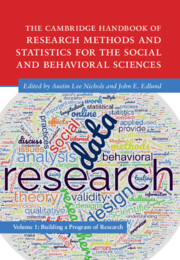 The Cambridge Handbook of Research Methods and Statistics for the Social and Behavioral Sciences
The Cambridge Handbook of Research Methods and Statistics for the Social and Behavioral Sciences Book contents
- The Cambridge Handbook of Research Methods and Statistics for the Social and Behavioral Sciences
- Cambridge Handbooks in Psychology
- The Cambridge Handbook of Research Methods and Statistics for the Social and Behavioral Sciences
- Copyright page
- Dedication
- Contents
- Figures
- Tables
- Contributors
- Preface
- Part I From Idea to Reality: The Basics of Research
- Part II The Building Blocks of a Study
- Part III Data Collection
- Part IV Statistical Approaches
- 21 Data Cleaning
- 22 Descriptive and Inferential Statistics
- 23 Testing Theories with Bayes Factors
- 24 Introduction to Exploratory Factor Analysis: An Applied Approach
- 25 Structural Equation Modeling
- 26 Multilevel Modeling
- 27 Meta-Analysis
- 28 Qualitative Analysis
- Part V Tips for a Successful Research Career
- Index
- References
24 - Introduction to Exploratory Factor Analysis: An Applied Approach
from Part IV - Statistical Approaches
Published online by Cambridge University Press: 25 May 2023
- The Cambridge Handbook of Research Methods and Statistics for the Social and Behavioral Sciences
- Cambridge Handbooks in Psychology
- The Cambridge Handbook of Research Methods and Statistics for the Social and Behavioral Sciences
- Copyright page
- Dedication
- Contents
- Figures
- Tables
- Contributors
- Preface
- Part I From Idea to Reality: The Basics of Research
- Part II The Building Blocks of a Study
- Part III Data Collection
- Part IV Statistical Approaches
- 21 Data Cleaning
- 22 Descriptive and Inferential Statistics
- 23 Testing Theories with Bayes Factors
- 24 Introduction to Exploratory Factor Analysis: An Applied Approach
- 25 Structural Equation Modeling
- 26 Multilevel Modeling
- 27 Meta-Analysis
- 28 Qualitative Analysis
- Part V Tips for a Successful Research Career
- Index
- References
Summary
This chapter provides an overview of exploratory factor analysis (EFA) from an applied perspective. We start with a discussion of general issues and applications, including definitions of EFA and the underlying common factors model. We briefly cover history and general applications. The most substantive part of the chapter focuses on six steps of EFA. More specifically, we consider variable (or indicator) selection (Step 1), computing the variance–covariance matrix (Step 2), factor-extraction methods (Step 3), factor-retention procedures (Step 4), factor-rotation methods (Step 5), and interpretation (Step 6). We include a data analysis example throughout (with example code for R), with full details in an online supplement. We hope the chapter will provide helpful guidance to applied researchers in the social and behavioral sciences.
Keywords
- Type
- Chapter
- Information
- The Cambridge Handbook of Research Methods and Statistics for the Social and Behavioral SciencesVolume 1: Building a Program of Research, pp. 513 - 534Publisher: Cambridge University PressPrint publication year: 2023
References
- 1
- Cited by
